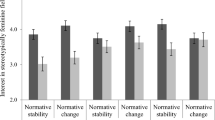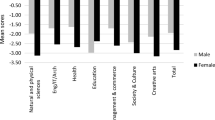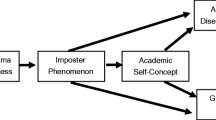Abstract
Academic engagement is vital for college students, yet existing studies reveal inconsistencies in how gender influences academic engagement. Building upon the statistical discrimination theory and identity-based motivation theory, this study develops an integrated model to examine gender differences in college students’ academic engagement. Further, the role that gender-role orientation in influencing academic engagement was investigated. Using a sample of 524 college students (Mage = 21.11, SD = 1.98; 47.7% women) from a large university collected in two time periods, the findings indicate that in the Chinese context, women anticipate higher future sex discrimination than men. However, gender-role orientation restores parity between men and women through a moderated mediation: egalitarian gender-role orientation has a stronger effect on women’s anticipated future sex discrimination than on men’s, resulting in increased academic engagement of women. The findings highlight the need to consider female students’ egalitarian beliefs in gender-related academic research.


Similar content being viewed by others
References
Aarntzen, L., van der Lippe, T., van Steenbergen, E., & Derks, B. (2021). How individual gender role beliefs, organizational gender norms, and national gender norms predict parents’ work-Family guilt in Europe. Community, Work & Family, 24(2), 120–142. https://doi.org/10.1080/13668803.2020.1816901.
Abreu, M., & Grinevich, V. (2017). Gender patterns in academic entrepreneurship. The Journal of Technology Transfer, 42(4), 763–794. https://doi.org/10.1007/s10961-016-9543-y.
Ahrens, J. A., & O’Brien, K. M. (1996). Predicting gender-role attitudes in adolescent females: Ability, agency, and parental factors. Psychology of Women Quarterly, 20(3), 409–417. https://doi.org/10.1111/j.1471-6402.1996.tb00308.x.
Aigner, D. J., & Cain, G. G. (1977). Statistical theories of discrimination in labor markets. Industrial and Labor Relations Review, 30(2), 175–187. https://doi.org/10.1177/001979397703000204.
Balkis, M., & Erdinç, D. (2017). Gender differences in the relationship between academic procrastination, satifaction with academic life and academic performance. Electronic Journal of Research in Educational Psychology, 15(1), 105–125. https://doi.org/10.14204/ejrep.41.16042.
Banks, J. A. (1995). Multicultural education: Its effects on students’ racial and gender role attitudes. In J. A. B. C. A. M. Banks (Ed.), Handbook of research on multicultural education (Vol. 19, pp. 617–627). Macmillan.
Brody, G. H., Chen, Y. F., Murry, V. M., Ge, X., Simons, R. L., Gibbons, F. X., Gerrard, M., & Cutrona, C. E. (2006). Perceived discrimination and the adjustment of African American youths: A five‐year longitudinal analysis with contextual moderation effects. Child Development, 77(5), 1170–1189. https://doi.org/10.1111/j.1467-8624.2006.00927.x.
Burt, C. H., Simons, R. L., & Gibbons, F. X. (2012). Racial discrimination, ethnic-racial socialization, and crime: A micro-sociological model of risk and resilience. American Sociological Review, 77(4), 648–677. https://doi.org/10.1177/0003122412448648.
Chang, L., Hau, K. T., & Guo, A. M. (2001). The Effect of Self‐Consciousness on the Expression of Gender Views 1. Journal of Applied Social Psychology, 31(2), 340–351. https://doi.org/10.1111/j.1559-1816.2001.tb00200.x.
Chee, K. H., Pino, N. W., & Smith, W. L. (2005). Gender differences in the academic ethic and academic achievement. College Student Journal, 39(3), 604–619. https://link.gale.com/apps/doc/A135842846/AONE?u=anon~f11d5a61&sid=googleScholar&xid=30893d64
Corrigall, E. A., & Konrad, A. M. (2007). Gender role attitudes and careers: A longitudinal study. Sex Roles, 56(11), 847–855. https://doi.org/10.1007/s11199-007-9242-0.
Davis, S. N., & Greenstein, T. N. (2009). Gender ideology: Components, predictors, and consequences. Annual review of Sociology, 35, 87–105. https://doi.org/10.1146/annurev-soc-070308-115920.
Di Tella, M., Miti, F., Ardito, R. B., & Adenzato, M. (2020). Social cognition and sex: Are men and women really different? Personality and Individual Differences, 162, 110045 https://doi.org/10.1016/j.paid.2020.110045.
Diekman, A. B., Steinberg, M., Brown, E. R., Belanger, A. L., & Clark, E. K. (2017). A goal congruity model of role entry, engagement, and exit: Understanding communal goal processes in STEM gender gaps. Personality and Social Psychology Review, 21(2), 142–175. https://doi.org/10.1177/1088868316642141.
Doering, L., & Thébaud, S. (2017). The effects of gendered occupational roles on men’s and women’s workplace authority: Evidence from microfinance. American Sociological Review, 82(3), 542–567. https://doi.org/10.1177/0003122417703087.
Eagly, A. H. (1987). Sex differences in social behavior: A social-role interpretation. Erlbaum.
Erden, F. T. (2009). A course on gender equity in education: Does it affect gender role attitudes of preservice teachers? Teaching and Teacher Education, 25(3), 409–414. https://doi.org/10.1016/j.tate.2008.11.001.
Fisk, S. R., & Overton, J. (2019). Who wants to lead? Anticipated gender discrimination reduces women’s leadership ambitions. Social Psychology Quarterly, 82(3), 319–332. https://doi.org/10.1177/0190272519863424.
Fredricks, J. A., Blumenfeld, P. C., & Paris, A. H. (2004). School engagement: Potential of the concept, state of the evidence. Review of Educational Research, 74(1), 59–109. https://doi.org/10.3102/00346543074001059.
Gee, G. C., Walsemann, K. M., & Brondolo, E. (2012). A life course perspective on how racism may be related to health inequities. American Journal of Public Health, 102(5), 967–974. https://doi.org/10.2105/AJPH.2012.300666.
Halpern, D. F. (1997). Sex differences in intelligence: Implications for education. American Psychologist, 52(10), 1091–1102. https://doi.org/10.1037/0003-066X.52.10.1091.
Heard-Garris, N. J., Cale, M., Camaj, L., Hamati, M. C., & Dominguez, T. P. (2018). Transmitting trauma: A systematic review of vicarious racism and child health. Social Science & Medicine, 199, 230–240. https://doi.org/10.1016/j.socscimed.2017.04.018.
Herda, D. (2021). Experienced, anticipated, and vicarious discrimination: Consequences and resilience for minority adolescents’ school engagement. Social Currents, 8(6), 591–612. https://doi.org/10.1177/23294965211003110.
Jin, S., Liu, N., & Ma, C. (2023). Fertility Policy: The Hidden Trap of Female Employment. Journal of Education, Humanities and Social Sciences, 8, 390–397. https://doi.org/10.54097/ehss.v8i.4278.
Judge, T. A., & Livingston, B. A. (2008). Is the gap more than gender? A longitudinal analysis of gender, gender-role orientation, and earnings. Journal of Applied Psychology, 93(5), 994–1012. https://doi.org/10.1037/0021-9010.93.5.994.
Kessels, U., Heyder, A., Latsch, M., & Hannover, B. (2014). How gender differences in academic engagement relate to students’ gender identity. Educational Research, 56(2), 220–229. https://doi.org/10.1080/00131881.2014.898916.
King, T., Perales, F., Singh, A., Gurrin, L., & Crammond, B. (2021). Traditionalism vs egalitarianism: Is there an association between gender attitudes and mental health? Australian & New Zealand Journal of Psychiatry, 56(7), 844–851. https://doi.org/10.1177/00048674211031488.
Knoke, D., & Ishio, Y. (1998). The gender gap in company job training. Work and Occupations, 25(2), 141–167. https://doi.org/10.1177/0730888498025002002.
Kulik, L. (2005). Predicting gender role stereotypes among adolescents in Israel: The impact of background variables, personality traits, and parental factors. Journal of Youth Studies, 8(1), 111–129. https://doi.org/10.1080/13676260500063736.
Lavenex, P. B., & Lavenex, P. (2010). Spatial relational learning and memory abilities do not differ between men and women in a real-world, open-field environment. Behavioural Brain Research, 207(1), 125–137. https://doi.org/10.1016/j.bbr.2009.09.046.
Liu, C., Abdul Rahman, M. N., Wang, X., & Mao, Y. (2022). Parental demands for childcare services of infants and toddlers in China under the three-child policy. Child Care in Practice, 1–25. https://doi.org/10.1080/13575279.2022.2109596.
McLean, K. C., Boggs, S., Haraldsson, K., Lowe, A., Fordham, C., Byers, S., & Syed, M. (2020). Personal identity development in cultural context: The socialization of master narratives about the gendered life course. International Journal of Behavioral Development, 44(2), 116–126. https://doi.org/10.1177/0165025419854150.
McWhirter, E. H. (1997). Perceived barriers to education and career: Ethnic and gender differences. Journal of Vocational Behavior, 50(1), 124–140. https://doi.org/10.1006/jvbe.1995.1536.
Moss-Racusin, C. A., Sanzari, C., Caluori, N., & Rabasco, H. (2018). Gender bias produces gender gaps in STEM engagement. Sex Roles, 79, 651–670. https://doi.org/10.1007/s11199-018-0902-z.
Oyserman, D., & Destin, M. (2010). Identity-based motivation: Implications for intervention. The Counseling Psychologist, 38(7), 1001–1043. https://doi.org/10.1177/0011000010374775.
Oyserman, D., Lewis, Jr, N. A., Yan, V. X., Fisher, O., O’Donnell, S. C., & Horowitz, E. (2017). An identity-based motivation framework for self-regulation. Psychological Inquiry, 28(2-3), 139–147. https://doi.org/10.1080/1047840X.2017.1337406.
Pekrun, R., Goetz, T., Titz, W., & Perry, R. P. (2002). Academic emotions in students’ self-regulated learning and achievement: A program of qualitative and quantitative research. Educational Psychologist, 37(2), 91–105. https://doi.org/10.1207/S15326985EP3702_4.
Peplau, L. A. (1976). Impact of fear of success and sex-role attitudes on women’s competitive achievement. Journal of Personality and Social Psychology, 34(4), 561–568. https://doi.org/10.1037/0022-3514.34.4.561.
Perkmann, M., Salandra, R., Tartari, V., McKelvey, M., & Hughes, A. (2021). Academic engagement: A review of the literature 2011-2019. Research Policy, 50(1), 104114 https://doi.org/10.1016/j.respol.2020.104114.
Qin, M., Brown, J. J., Padmadas, S. S., Li, B., Qi, J., & Falkingham, J. (2016). Gender inequalities in employment and wage-earning among internal labour migrants in Chinese cities. Demographic Research, 34, 175–202. https://doi.org/10.4054/DemRes.2016.34.6.
Reichelt, M., Makovi, K., & Sargsyan, A. (2021). The impact of COVID-19 on gender inequality in the labor market and gender-role attitudes. European Societies, 23(sup1), S228–S245. https://doi.org/10.1080/14616696.2020.1823010.
Reilly, D., Neumann, D. L., & Andrews, G. (2019). Gender differences in reading and writing achievement: Evidence from the National Assessment of Educational Progress (NAEP). American Psychologist, 74(4), 445–458. https://doi.org/10.1037/amp0000356.
Schaufeli, W. B., & Bakker, A. B. (2003). Utrecht Work Engagement Scale. Preliminary manual. Utrecht University.
Schwiter, K., Nentwich, J., & Keller, M. (2021). Male privilege revisited: How men in female‐dominated occupations notice and actively reframe privilege. Gender, Work & Organization, 28(6), 2199–2215. https://doi.org/10.1111/gwao.12731.
Shi, S., Liang, Z., & Zhou, H. (2022). Gender differences in objective and subjective social reproduction in China: do educational attainment and social capital matter? Chinese Sociological Review, 54(3), 278–303. https://doi.org/10.1080/21620555.2022.2033116.
Shoval, E., Shachaf, M., Ramati-Dvir, O., & Shulruf, B. (2021). Gender matters when sports engagement and self-efficacy interact with academic achievement. Social Psychology of Education, 24(1), 75–94. https://doi.org/10.1007/s11218-020-09598-4.
Sickman, E., Belisle, J., Payne, A., Hutchison, L., & Travis, E. (2023). An exploratory analysis of gender stereotyping using the theoretical framework of relational density theory. Journal of Contextual Behavioral Science, 28, 256–265. https://doi.org/10.1016/j.jcbs.2023.04.007.
Skinner, E. A., Kindermann, T. A., & Furrer, C. J. (2009). A motivational perspective on engagement and disaffection: Conceptualization and assessment of children’s behavioral and emotional participation in academic activities in the classroom. Educational and Psychological Measurement, 69(3), 493–525. https://doi.org/10.1177/0013164408323233.
Spector, P. E. (2006). Method variance in organizational research: Truth or urban legend? Organizational Research Methods, 9(2), 221–232. https://doi.org/10.1177/1094428105284955.
Steele, J. P., & Fullagar, C. J. (2009). Facilitators and outcomes of student engagement in a college setting. The Journal of Psychology, 143(1), 5–27. https://doi.org/10.3200/JRLP.143.1.5-27.
Wang, M.-T., & Eccles, J. S. (2013). School context, achievement motivation, and academic engagement: A longitudinal study of school engagement using a multidimensional perspective. Learning and Instruction, 28, 12–23. https://doi.org/10.1016/j.learninstruc.2013.04.002.
Weatherill, R. P., Vogt, D. S., Taft, C. T., King, L. A., King, D. W., & Shipherd, J. C. (2011). Training experiences as mediators of the association between gender-role egalitarianism and women’s adjustment to Marine recruit training. Sex Roles, 64(5), 348–359. https://doi.org/10.1007/s11199-010-9921-0.
Wood, W., & Eagly, A. H. (2015). Two traditions of research on gender identity. Sex Roles, 73, 461–473. https://doi.org/10.1007/s11199-015-0480-2.
Yang, J. (2020). Women in China moving forward: Progress, challenges and reflections. Social Inclusion, 8(2), 23–35. https://doi.org/10.17645/si.v8i2.2690.
Ye, B., & Zhao, Y. (2018). Women hold up half the sky? Gender identity and the wife’s labor market performance in China. China Economic Review, 47, 116–141. https://doi.org/10.1016/j.chieco.2017.08.002.
Zhang, N. (2006). Gender role egalitarian attitudes among Chinese college students. Sex Roles, 55, 545–553. https://doi.org/10.1007/s11199-006-9108-x.
Zhaopin.com. (2023). Chinese women’s workplace status survey report. https://promote.caixin.com/2023-05-12/102051143.html.
Zhu, Q., Cheong, Y., Wang, C., & Tong, J. (2021). The impact of maternal and paternal parenting styles and parental involvement on Chinese adolescents’ academic engagement and burnout. Current Psychology, 1–14. https://doi.org/10.1007/s12144-021-01611-z.
Funding
This work was supported by the National Natural Science Foundation of China (72202162).
Data Sharing and DeclarationData are available from the authors upon reasonable request.
Author information
Authors and Affiliations
Contributions
J.X. conceived the study, participated in its design, performed statistical analyses, and drafted the manuscript; L.Y. participated in the data collection, and rewrote parts of the manuscript; X.Z. participated in the data collection, and provided critical feedback on the draft of the manuscript. All authors read and approved the final manuscript.
Corresponding author
Ethics declarations
Conflict of Interest
The authors declare no competing interests.
Ethics Approval
Ethics approval and consent to participate was obtained for this study and approved by the Research Ethics Committee of Wuhan University.
Informed Consent
A passive consent procedure was used. If students did not want to participate, they were allowed to opt out of participation at any time.
Additional information
Publisher’s note Springer Nature remains neutral with regard to jurisdictional claims in published maps and institutional affiliations.
Rights and permissions
Springer Nature or its licensor (e.g. a society or other partner) holds exclusive rights to this article under a publishing agreement with the author(s) or other rightsholder(s); author self-archiving of the accepted manuscript version of this article is solely governed by the terms of such publishing agreement and applicable law.
About this article
Cite this article
Xu, J., Yu, L. & Zhang, X. Bridging the Gender Gap in Academic Engagement among Young Adults: The Role of Anticipated Future Sex Discrimination and Gender-role Orientation. J. Youth Adolescence (2024). https://doi.org/10.1007/s10964-024-02009-3
Received:
Accepted:
Published:
DOI: https://doi.org/10.1007/s10964-024-02009-3




